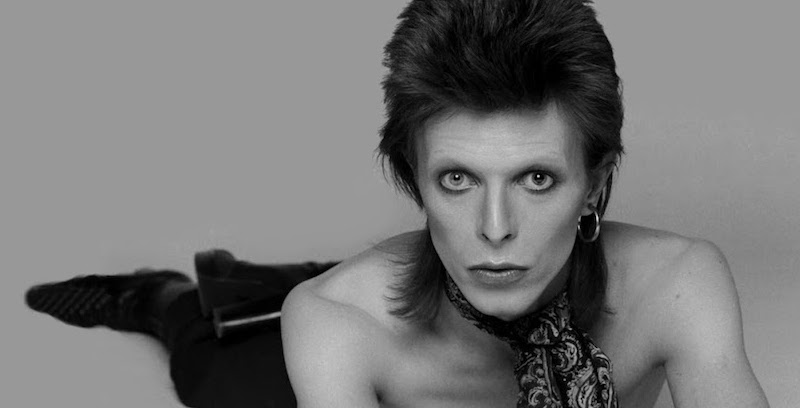
Shock, Awe, and Fun: How David Jones Became David Bowie
Suzi Ronson on Witnessing the Rise of a Rock Icon
Angie calls in a high state of excitement: they’re going to see Elvis at Madison Square Garden in New York City. “Come over, David must look wonderful!” I want to go with them…there’s no chance of that happening, but still, a girl can dream. As I drive to Haddon Hall, I can’t help but think over and over…they’re going to see ELVIS!
When I get there, David is full of nervous energy, pacing up and down, smoking one cigarette after another. All he talks about is meeting Elvis—how it will be, what he should say, what he should wear and, above all else, how can he look really young? He wants to be seen as the heir apparent; he’s planning a photo of him and Elvis where he’ll be looking up at the older man.
“I’d sell my soul to be famous.” It just comes out.
Angie and I look at each other in silence. I feel as if I’m in a melodramatic black-and-white 1940s movie. It doesn’t feel quite serious, like he’s trying out saying it. Elvis has been a huge star my whole life. Even before The Beatles there was Elvis, so it’s a surprise to me that David compares himself to Elvis and I marvel at his confidence. I mean, David’s good, he’s really good—but Elvis?!
It’s a fast trip, there and back, just to see Elvis. They’re flying—something David said he’d never do again, citing Buddy Holly and Ritchie Valens’s deaths, each of them just as their star is rising. They pack; Angie must look good too, she’s got a part to play, and Mick and Tony are going as well. I make sure there’s enough GARD and hair spray and off they go.
Onstage, Mick’s masculine sex appeal plays off against David’s femininity. It’s thrilling, irreverent, and oh-so appealing.
“’e’s unbelievable,” Mick says when they get back. “The women are mad for ’im, they throw their knickers at ’im an’ Elvis mops ’is brow wi’ ’em!” He can’t stop laughing. “When he cums on for t’encore, there’s such a kerfuffle down front, security blokes tryin’ to keep the gurls from jumpin’ up on t’stage, Elvis leanin’ down to ’em, encouragin’ ’em. They go mad! Those security blokes ’ave a really tough job.” He shakes his head at the memory of it. “I were nervous. I thought we’d be crushed, there’s 42,000 people in Madison Square Garden, and when everybody stood up and pushed forward, we couldn’t move.” It’s obvious he’s completely in awe of Elvis’s charisma. “After t’last number he runs off t’stage, gurls are screamin’ and cryin’, and then, over the loudspeakers, an announcement: ‘Elvis has left the building!'” He waves his hands as if holding back traffic. “And just like that, ’e’s gone, the audience are goin’ crazy, sum gurls are faintin’.” He can’t get over it.
It’s affected them all, and none more so than David’s manager, Tony Defries.
Even though I haven’t got a proper job with David yet, I’m loving my life, I love it all. It feels like I’ve arrived, bearing witness to the get-in and set-up at each venue I manage to go to. The sound check, the slow build to the show. The band just get better and better, their sound more powerful than ever. Tickets sell, people are talking—there’s never been a band like this, so glamorous, so controversial.
They shock people, they get more and more attention. And then later that month comes Oxford.
The show kicks off at the Town Hall, students crowding the front and pressing against the stage. It’s going to be a good show; they’re all good shows. I’m at the side of the stage having a great time, and as I watch the band I’m dancing, inside and out. The photographer Mick Rock’s here too, snapping away.
The last song of the set is “Suffragette City,” and as Mick goes into his solo David walks over to him and bends his face down towards the guitar strings. My jaw drops—what is he doing? Mick shuts his eyes as David uses his teeth on the strings, his hands reaching around and grabbing Mick’s arse…OH MY GOD! My first thought is for Mick: he’s been called gay a few times and hates it. Did he know David was going to do this? Whatever he’s thinking, he plays with his eyes closed.
Stuey, who’s crouched down behind a monitor, glances at me and we both have one of those “what in the world” laughs in surprise. The crowd is silent…before bursting into a roar and going wild! Stuey has his job cut out for him protecting David and the band from their fans. Mick Rock is still snapping away behind me; I can see flashes over my shoulder. The look between Woody and Trevor is priceless. Mick’s face is unfathomable, his eyes still closed.
David releases him and with a “wham bam thank you ma’am” comes off, grabbing the cigarette from me and shouting to Mick Rock: “Did you get it? Did you get it?”
Mick follows us back to the dressing room, saying in his slow way, “What were that about, David?” He looks perplexed.
“Did you get it?” David repeats.
“Well, I’ll know tomorrow,” Mick Rock says. “I certainly got something.”
The band is unusually quiet when I go to their room. Mick puffs on a cigarette and looks white under his make-up. I ask him if he’s okay.
“I suppose.” Then with a sigh, “But me parents…”
He doesn’t need to say more. I’m also thinking about my parents, and I’m just the hairdresser.
Within the week, the photo is plastered as a full-page ad in Melody Maker. It’s from David, thanking the fans and crew, and it’s an amazing photo—solid shock and awe, just what David needs. But Mick is upset, he threatens to quit; he’s threatened before, over costumes and such, but this time it feels more serious.
I wonder if David’s worried about losing Mick. He was a folk singer before Mick came along; Mick transformed him both onstage and in the studio. Onstage, Mick’s masculine sex appeal plays off against David’s femininity. It’s thrilling, irreverent, and oh-so appealing. Somehow, they talk it out, and whatever David says seems to work. The move ends up being a part of every show.
I think David would be lost without him.
__________________________________

From Me and Mr. Jones: My Life with David Bowie and the Spiders from Mars by Suzi Ronson. Copyright © 2024. Available from Pegasus Books.
Suzi Ronson
Suzi Ronson is an author, songwriter, and former hairdresser and stylist. At fifteen, she enrolled in the Evelyn Paget College of Hair and Beauty, going on to become David Bowie’s stylist after helping create his iconic Ziggy Stardust hairstyle. She traveled the world with Bowie as his hairdresser, stylist, and confidante. Ronson has also worked with Lou Reed, Iggy Pop, and John Mellencamp. She divides her time between London and New York.



















